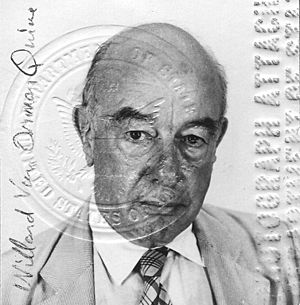Willard Van Orman Quine facts for kids
Quick facts for kids
Willard Van Orman Quine
|
|
|---|---|
 |
|
| Born | June 25, 1908 |
| Died | December 25, 2000 (aged 92) |
| Education | Oberlin College (B.A., 1930) Harvard University (Ph.D., 1932) |
| Spouse(s) |
Naomi Clayton
(m. 1932; div. 1947)Marjorie Boynton
(m. 1948; died 1998) |
| Awards | Rolf Schock Prize in Logic and Philosophy (1993) Kyoto Prize (1996) |
| Era | 20th-century philosophy |
| Region | Western philosophy |
| School | Analytic Mathematical nominalism (1947) Mathematical quasi-empiricism (1960) Immanent realism Neopragmatism Empiricism Anti-foundationalism Logical behaviorism |
| Institutions | Harvard University |
| Thesis | The Logic of Sequences: A Generalization of Principia Mathematica (1932) |
| Doctoral advisor | Alfred North Whitehead |
| Other academic advisors | C. I. Lewis |
| Doctoral students | David Lewis, Gilbert Harman, Dagfinn Føllesdal, Hao Wang, Burton Dreben, Charles Parsons, John Myhill |
| Other notable students | Donald Davidson, Daniel Dennett |
|
Main interests
|
Logic, ontology, epistemology, philosophy of language, philosophy of mind, philosophy of mathematics, philosophy of science, set theory |
|
Notable ideas
|
List
New Foundations, abstract objects, indeterminacy of translation (holophrastic indeterminacy, inscrutability of reference, ontological relativity, gavagai), radical translation, referential transparency, naturalized epistemology, meta-ontology, ontological/ideological commitment, natural kind, semantic ascent, Quine's paradox, Duhem–Quine thesis, Quine–Putnam indispensability thesis, semantic holism (confirmation holism, web of belief, hold come what may), extensionalism, problem of empty names, propositional attitude, two dogmas of empiricism, principle of charity, cognitive synonymy, , mathematical quasi-empiricism, Quine–McCluskey algorithm, Quine–Morse set theory, vivid designator, predicate functor logic, Quine quotation, Quine corners, Quine atom, Plato's beard, existential generalization and universal instantiation, veridical vs. falsidical paradoxes
|
|
Influenced
|
|
Willard Van Orman Quine (known to his friends as "Van") was an important American philosopher and logician. He was born on June 25, 1908, and passed away on December 25, 2000. Many people consider him one of the most influential philosophers of the 20th century.
Quine spent most of his life connected to Harvard University. He was a student there from 1930 and later became a professor. He held a special teaching position, the Edgar Pierce Chair of Philosophy, from 1956 to 1978.
Contents
Quine's Main Ideas
Willard Van Orman Quine was a teacher of logic and set theory. He believed that first-order logic was the only true kind of logic. He even created his own system for mathematics and set theory, called New Foundations.
Philosophy and Science
Quine thought that philosophy was not separate from science. Instead, he saw it as a part of science itself. He famously said, "philosophy of science is philosophy enough." He wanted to understand science using scientific methods.
He also developed something called "naturalized epistemology." This idea tries to explain how we learn complex scientific theories from simple observations. Quine also talked about "ontological relativity" in science, which is part of the Duhem–Quine thesis. This idea suggests that our scientific theories depend on how we choose to look at the world.
Important Writings
Quine wrote many important papers and books. One famous paper is "On What There Is." In it, he explained Bertrand Russell's ideas about descriptions. He also shared his famous rule about what exists: "To be is to be the value of a variable." This means something exists if we can talk about it using a variable in logic.
Another key paper was "Two Dogmas of Empiricism" (1951). In this paper, he challenged two common beliefs in philosophy. He argued against the idea that we can always separate statements into "analytic" (true by definition) and "synthetic" (true based on facts). He also questioned the idea that all knowledge comes from simple observations.
Quine suggested a different idea called "semantic holism." This means that the meaning of a word or sentence depends on its connection to many other words and beliefs. His books, like The Web of Belief and Word and Object (1960), further explained these ideas. In Word and Object, he introduced the "indeterminacy of translation" thesis. This idea suggests that there might be many ways to translate a language, and we can't always know which one is perfectly correct.
Awards and Recognition
Quine was highly respected in the world of philosophy. In 2009, a survey of analytic philosophers ranked him as the fifth most important philosopher of the last two centuries.
He received the first Schock Prize in Logic and Philosophy in 1993. This award recognized his deep thoughts on how we learn language and communicate. He also won the Kyoto Prize in Arts and Philosophy in 1996. This prize honored his great contributions to philosophy in the 20th century.
See also
 In Spanish: Willard Van Orman Quine para niños
In Spanish: Willard Van Orman Quine para niños
 | Anna J. Cooper |
 | Mary McLeod Bethune |
 | Lillie Mae Bradford |

